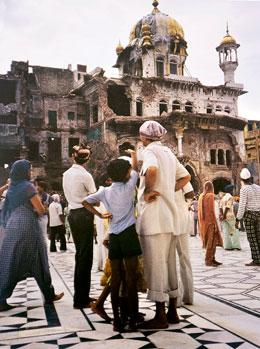Sikhs removed from blacklist

Dozens of Sikhs in Canada who were banned from returning to their homeland in Punjab because of alleged links to militant groups are cheering an initiative by Prime Minister Narendra Modi to remove them from a blacklist that denied them visas.
The move which comes ahead of elections in the state of Punjab, is seen as a boost to the aspirations of Modi’s BJP party and has been slammed by Indian security agencies.
The 32-year government blacklist, imposed by the Congress Party, banned India visits by Sikh Non-Resident Indians from 212 families in the United States, UK and Canada after
The Indian government blacklisted many Sikhs involved in anti-India propaganda and vandalism following the infamous Operation Bluestar of 1984. The Indian army at that time stormed the Golden Temple, the holiest shrine of the Sikhs in Amritsar, Punjab, to flush out the armed religious extremists, who had fortified the place of worship.
The operation infuriated Sikhs across the world, compelling idealistic, emotional youths to join militant ranks. There were angry protests in Vancouver as well, where several men vandalized the Indian consulate office. Subsequently, the government of India blacklisted Sikhs involved in separatist activities, citing security concerns.
Others on the blacklist were linked to the bombing of Air India flight 182 which was flying over the Atlantic Ocean en route New Delhi from Montreal via London on June 23, 1985 when it exploded in mid-air, killing all 329 people on board, including 22 crew members.
The now defunct South Asian Human Rights’ Group (SAHRG), which campaigned for the blacklistees’ cause, estimates that between 70 to 80 Sikhs living in Western Canada have been denied an Indian passport or visas by the Indian government.
Officials familiar with the government's decision on removing the blacklist said a committee headed by additional secretary of the home ministry had examined the blacklist, and 212 cases of a total of 324 were removed, the Economist reported.
Prime Minister Narendra Modi's visits to the UK and Canada had seen several representations from Sikh NRI groups asking for reconsideration of the India travel ban. Officials said the proposal to remove the ban was opposed by the Intelligence Bureau. But the PMO intervened, and a committee was set up after which IB was asked to reexamine each case.
One official explained that many of the blacklisted names were arbitrary. Entire families had been blacklisted on grounds that did not bear up to close scrutiny. The blacklist was never publicly acknowledged. But following several visa denials over the years, Sikh groups started voicing opposition to what they described as systematic discrimination.
Among those on the so-called blacklist is Ajaib Singh Bagri, the fiery Indo-Canadian preacher from Kamloops, B.C. who was acquitted of the Air India bombing.
While most impacted by the blacklist were cheering the move by India, some cast spersions on the Indian government motives.
Britain-based Dal Khalsa leader Manmohan Singh Bajaj, whose name has been deleted from the ‘blacklist’ by the Indian government, said he would prefer to “die in a foreign country as a rebel than return to Punjab as a defeated person.”
Bajaj, originally from Chandigarh, declared that though his name had been struck off the list, he won’t come back as “the Sikhs had not achieved their goal for which the struggle was launched in the early eighties.”
Bajaj said he was surprised at the deletion of his name from the blacklist. “I have neither approached anyone for any favour nor do I subscribe to the step taken by the Indian government”, he said while expressing fears that the step of the government could be aimed at luring hardliner Sikhs to India and then arresting them.









